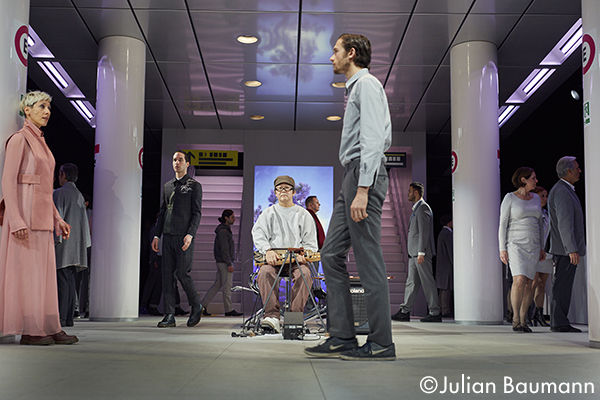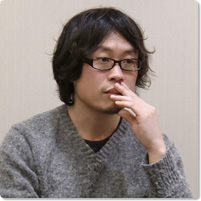Noh (NŌ): “Roppongi”
A young man appears (in the Noh
Waki
[supporting] role). Near midnight, the young man wanders the city of Tokyo aimlessly, riding the subway system. From time to time, impulse moves him to wander the city center this way without purpose or reason.
He gets off the subway at Roppongi station, a place he has no relation with, past or present. A man appears (in the Noh
Shite
[leading] role) and speaks to the young man, saying, “There is something I want to ask a young person like you.”
He asks, “How does it feel? To be a young person in a nation in decline; a youth in an environment where there is nothing to look forward to in the future?”
To this, the young man can only reply, “I don’t really feel anything. Because, that’s the given situation for me. It’s the society’s default state.”
When the young man complains that he feels pressured being questioned in this way, the man replies, “I have no right to question you.” The man was a dealer at a city bank. He informs the young man, “You are here because I summoned you here.” As he leaves the stage the man says that he wanted to talk to make amends for his past sins.
A station employee (
Ai
[counterpart/connecting] role, also a member of the Noh chorus in this case) asks the young man if he is OK, explaining that he was concerned seeing the young man wandering around alone. When the young man explains that he had just been talking to an older man who suddenly appeared, the station employee informs him that it was the ghost of a man who committed suicide here ten years earlier by jumping in front of a train.
The man (
Shite
) appears again, wearing a Noh mask, and begins to speak. He explains how the Plaza Accord for international currency stability of September 1985 resulted in inflation of the value of the yen that in turn triggered a period of recession. Then, lowering of interest rates to encourage domestic demand and consumption resulted in Japan’s crazy Bubble Economy. He goes on to explain the process by which the Roppongi club and entertainment district prospered amid the rapidly growing false wealth of the Bubble until it all collapsed.
Thirty years has changed Roppongi into a barren wilderness. The man says how he has watched this process from a tower high above. “There was nothing I could do,” he says. “But it may there was something I could have done, but I just didn’t try. And if so, wasn’t that a sin in itself?” The man leaves, and then the young man goes up to the street level to take a look around Roppongi.
Kyogen: “Gertrude”
An actor enters. She introduces herself as a stage actor living in the neighborhood and then launches into a long monologue.
She complains about the difficulty of memorizing long monologues on the way to the rehearsal studio, and she has harsh words for playwrights who mercilessly write those long lines. Finally she reaches the subway station. While waiting on the underground platform for the train to come she says what a good place it is for memorizing her lines, and then starts mumbling the lines of Gertrude from the play
Hamlet
she is now rehearsing.
She says that reciting lines to himself over and over hundreds of times is her way of memorizing them, but that other actors each have their own different ways of memorizing theirs. There are some actors who say that reciting lines out loud over and over takes the freshness out of the eventual performance.
Using one of the line of pillars on the platform as an imaginary partner, the actor begins a discussion about methods for memorizing lines. “I heard about a way of learning lines by writing them out over and over, and I wanted to try it.”
“But, I heard about an actor who used that method wrote so much that they got tendinitis.”
“Oh, no! Then they couldn’t memorize their lines anymore, could they.”
“It’s no problem. Voice input technology has gotten so good recently that they can write pretty accurately just by speaking the lines into their computer, couldn’t they?”
“That’s amazing!”
Noh (NŌ): “Tocho-mae”
A young man (Noh
Waki
[supporting] role) introduces himself as being born and raised in Hiroshima and has now come to Tokyo for the first time for sightseeing. He says he wants to visit the skyscrapers in West-Shinjuku. He also wants to see the Park Hyatt hotel there that was used as a setting in the movie
Lost in Translation
, then finally he arrives at the Tocho-mae subway station in West-Shinjuku.
As he is confused and unable to find which exit goes to the
Tocho
(Tokyo Metropolitan Government Building), Woman 1 (
Shite
) appears and tells him he should use Exit A3. The young man tells her that he wants to go up to the Observation Decks at the top of the building and that he then wants to go see the bar in the Park Hyatt where scenes were filmed for the movie.
Woman 1 speaks. She tells the young man that the Tokyo depicted in that movie is simply decoration designed to amplify the solitary loneliness of the two American main characters. She goes on to say that this city and this country also alienates the Japanese, in a different way from the way it alienates foreigners.
Woman 1 begins to talk a woman originally from Hiroshima who was elected to the Tokyo Metropolitan Assembly at a young age. Then she recommends that the young man go to see the woman who stands in the Citizens’ Square facing the National Diet Building. As a man, you should go and see that woman, she adds. He suddenly feels a chill in the air on the platform, and the next thing he knows, Woman 1 has disappeared.
A station employee (
Ai
[counterpart/connecting] role, also a member of the Noh chorus) comes up to talk to the young man. When the young man says that he suddenly feels a chill in the air, the station man asks, “Did you see ‘that woman’?” There is a rumor that a female ghost appears on this platform sometimes. There was an incident some years ago, when a young female Member of the Metropolitan Assembly was hackled during a speech by male Assembly members, with chauvinistic jeers like, “Can’t you even have children?” It was just after that the rumors about the ghost started. After that incident, it came to be called the ‘ghost of feminism’.
The young man goes to the Citizens’ Square. Woman 2 (
Tsure
[co-actor to the
Shite
] appears and says, “That day, she was shamed in the Assembly, I was shamed in that Assembly. But the incident was never settled and we lost our chance for redemption.” As the young man watched, Woman 2 appeared to be overcome by some force.
Woman 1 appears again and tells her true identity. She is a ghost formed as an embodiment of the awareness of women living today of all the regrettable abuse suffered by the women of the past in their lives. And in order for their grievances to be consoled, the mechanisms of this city and this country have to change. Until that happens, their will never be redemption for their collective souls.
The young man climbs the stairs out of the subway toward the Metropolitan Government Building.



